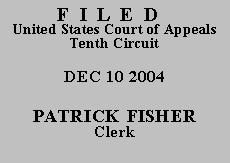 UNITED STATES COURT OF APPEALS
UNITED STATES COURT OF APPEALS
 UNITED STATES COURT OF APPEALS
UNITED STATES COURT OF APPEALS
TENTH CIRCUIT
| FREDERICK GRAY, | |
| v. | No. 03-6270 |
| MIKE ADDISON, Warden; and the ATTORNEY GENERAL OF THE STATE OF OKLAHOMA, | (D.C. No. CIV-00-562-L) |
ORDER AND JUDGMENT(*)
Before BRISCOE, BALDOCK, and TYMKOVICH, Circuit Judges.(2)
Petitioner Frederick Gray shot his girlfriend. He claimed at trial the shooting was an accident. An Oklahoma jury disagreed and convicted Petitioner of first degree murder. See 21 Okla. Stat. Ann. § 701.7(A). The state trial court sentenced Petitioner to life imprisonment. Petitioner appealed, raising nine claims of error.(1) The Oklahoma Court of Criminal Appeals summarily affirmed and denied Petitioner's request for rehearing.
Petitioner never sought any relief under the Oklahoma Post-Conviction Procedure Act. See 22 Okla. Stat. Ann. §§ 1080-1089. Instead, Petitioner filed an application for a writ of habeas corpus in the district court. See 28 U.S.C. § 2254. Petitioner asserted ten grounds for relief in his habeas petition: the first nine claims he raised on direct appeal in state court, see supra n.1, and an ineffective assistance of appellate counsel claim. The district court subsequently permitted Petitioner to amend his habeas petition to include a claim that his trial counsel was constitutionally ineffective for failing to pursue an insanity defense. Petitioner admitted neither ineffective assistance claim was raised in state court.
Petitioner's amended habeas petition therefore included exhausted and unexhausted claims. A magistrate judge recommended that "[Petitioner] not be required to return to state court to exhaust [his ineffective assistance of trial counsel claim] because the Oklahoma courts would find the claim procedurally barred." The magistrate judge thereafter recommended denying the writ on the merits of both Petitioner's exhausted and unexhausted claims. The district court, after holding an evidentiary hearing on Petitioner's unexhausted ineffective assistance of trial counsel claim and supplementing the magistrate judge's analysis, adopted the recommendation. The court subsequently granted Petitioner a certificate of appealability on the limited issue of whether Petitioner was denied his Sixth Amendment right to effective assistance of trial counsel. We have jurisdiction, 28 U.S.C. § 2253, proceed directly to the merits of Petitioner's ineffective assistance claim, and affirm.(2)
Petitioner asks us to determine whether his trial counsel's "failures prejudiced [him] by depriving the jury of essential, material evidence on the critical element of intent [to commit murder]." Petitioner, however, has not carried his burden of designating a record sufficient for us to answer that question. See 10th Cir. R. 10.3(A). The record on appeal in this case consists of (1) the original, amended, and second amended habeas petition, (2) the magistrate judge's report and recommendation, (3) Petitioner's motion to appoint a guardian ad litem and/or counsel, (4) the district court's order adopting the magistrate judge's recommendation, (5) the final judgment, (6) Petitioner's application for a certificate of appealability, (7) Petitioner's notice of appeal, and (8) the transcripts of the evidentiary hearing. Notably absent from the record is the state trial transcripts and other documents cited in the briefs. See 10th Cir. R. 10.1(A)(1) ("The appellant must provide all portions of the transcript necessary to give the court a complete and accurate record of the proceedings related to the issues on appeal."). Both parties assert the evidence presented at trial does not support the other's version of the shooting. We have no way of knowing who is correct. Furthermore, we cannot determine if the jury was deprived of "essential, material evidence" on the issue of Petitioner's intent to commit murder when we do not know what, if any, evidence was presented at trial on the issue of intent.
We need not remedy Petitioner's failure to designate an adequate record. See 10th Cir. R. 10.3(B). Instead, we must affirm where the evidentiary record is insufficient to permit review of Petitioner's claims. Scott v. Hern, 216 F.3d 897, 912 (10th Cir. 2000). Because we cannot meaningfully engage in the analysis required under Strickland v. Washington, 466 U.S. 668 (1984) on the record Petitioner submitted, the district court's final judgment denying Petitioner a writ of habeas corpus is
AFFIRMED.
Entered for the Court,
Bobby R. Baldock
Circuit Judge
*. This order and judgment is not binding precedent, except under the doctrines of law of the case, res judicata, and collateral estoppel. The court generally disfavors the citation of orders and judgments; nevertheless, an order and judgment may be cited under the terms and conditions of 10th Cir. R. 36.3.
2. After examining the briefs and appellate record, this panel has determined unanimously that oral argument would not materially assist the determination of this appeal. See Fed. R. App. P. 34(a)(2); 10th Cir. R. 34.1(G). The case therefore is ordered submitted without oral argument.
1. Petitioner specifically argued: (1) the state trial court erred in admitting human silhouette targets, other crime evidence, and a protective order; (2) the state trial court erred in admitting letters he wrote to the victim; (3) insufficient evidence existed to support his first degree murder conviction; (4) the State violated his right to pretrial notice of various evidence; (5) the state trial court erred in failing to instruct the jury on excusable homicide; (6) the state trial court erred in failing to instruct the jury on lesser included offenses; (7) the state trial court erred in permitting him to stand before the jury and reenact the events surrounding the shooting; (8) the state trial court erred in admitting a photograph; and (9) the state trial court's cumulative errors deprived him of a fair trial.
2. Respondents never argued in the district court or on appeal that Petitioner's ineffective assistance of trial counsel claim was unexhausted or procedurally barred. We perceive, given the ultimate disposition of this case, no reason to raise sua sponte either exhaustion or procedural bar. See Gonzales v. McKune, 279 F.3d 922, 926 (10th Cir. 2002).